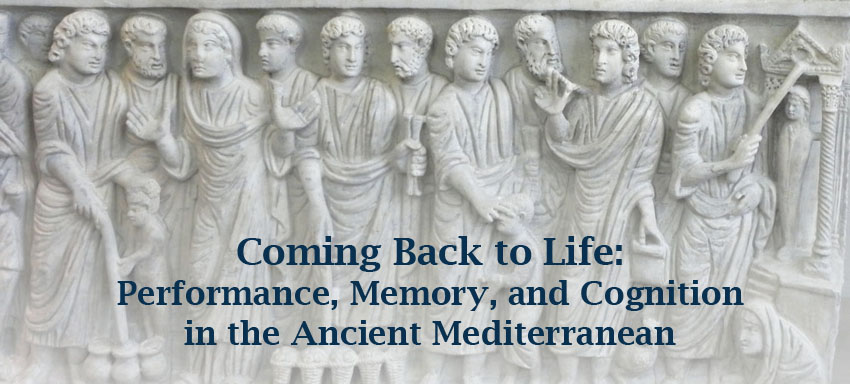
An International Scholarly Research Colloquium held at
McGill University and Concordia University
8–11 May 2014
The lines between death and life were neither fixed nor finite to the peoples of the ancient Mediterranean. For most, death was a passageway into a new and uncertain existence. The dead were not so much extinguished as understood to be elsewhere, and many asserted the potential of the deceased’s ongoing agency among the living. Even for those more sceptical of an afterlife, notions of coming back to life provided a framework in which to conceptualise social, cultural, religious, and even political structures. Whether through mnemonic commemoration, performative incantation, or conceptual recognition, that which was past could come back to life in a variety of ways in the ancient MediterraneanIn May 2014, an international group of scholars and students will convene in Montreal, Quebec, Canada to explore how antique communities configured, tested, and actualised the boundaries between mortality and immortality. How might the dead come back to life? In what ways, and through what means, can the dead continue to exercise agency among the living? What does it mean for that which is past—an individual or institution—to linger in the present? This four-day research colloquium aims to develop a greater understanding of how answers to questions like these informed the lives and practices of the peoples of the ancient Mediterranean.
Central to our examination is the recognition that antique ideas of coming back to life were not geographically, ethnically, nor traditionally localised. In important respects, the process of Romanisation from the first century BCE onward created an environment of cultural cross-pollination. This fostered contexts of exchange and hybridisation in which notions of coming back to life could be adapted, invented, and experimented with in various ways. In an effort to examine this problematic robustly, this research colloquium will convene 24 scholars (from Canada, the USA, the UK, Germany, and Norway), two postdoctoral fellows, and 12 graduate students with research expertise in various Greco-Roman cultures and societies, antique religions, archaeology, architecture, early Judaism, and early Christianity. The interdisciplinarity of this group promises to foster a rich interchange of scholarly ideas and perspectives.
Our research efforts will be oriented around the fixed yet interrelated categories of performance, memory, and cognition. Antique ideas of coming back to life correlate with these categories in various ways. For example, the presumption that the dead sustain consciousness beyond the grave suggests cognition and memory interlace in such a way that the living are perpetually reminded of the restless dead’s ongoing capacity for communication and awareness. Similarly, the performative and mnemonic dimensions of death-rites enable the deceased to be tangibly present among the living. Accordingly, antique ideas of coming back to life point toward a matrix in which both the living and the dead have certain performative, mnemonic, and/or cognitive abilities that, in various ways, enable revivification.
The Coming Back to Life colloquium will be held jointly at McGill University and Concordia University from 8–11 May 2014. Research will be presented in a variety of formats, including formal academic papers, targeted scholarly responses, a keynote address, and a selection of research posters. All the research exchanged through this colloquium will be open-access and made available to as wide an audience as possible. All sessions will be open to the interested public and scholarly communities, including the keynote lecture on Friday 9 May 2014 delivered by Sarah Iles Johnston (Ohio State University). Beyond the colloquium itself, all proceedings—including scholarly papers, response papers, research posters, and the video of the keynote address—will be published online by the McGill University Library as an open-access, peer-reviewed, digital book.
|
Ellen B. Aitken, Th.D. Frederick S. Tappenden, Ph.D. Carly Daniel-Hughes, Th.D. With collaboration from Amy Buckland |
|||||||||
|
|||||||||


